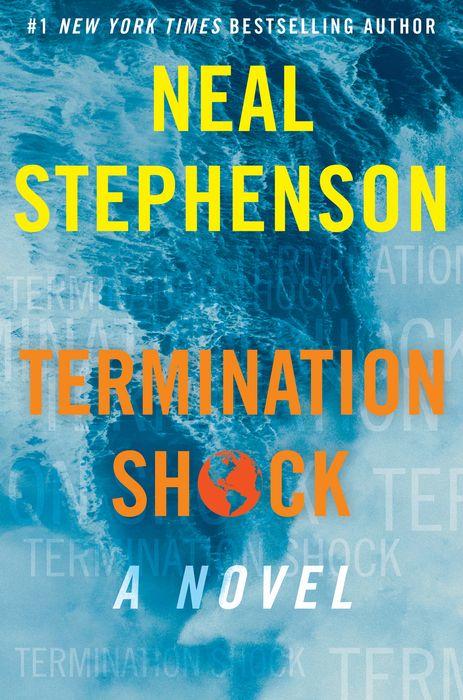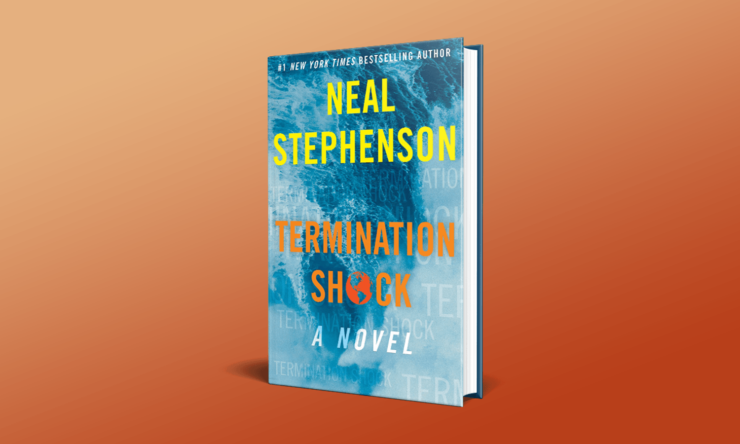It’s hard to start anywhere but with the feral hogs.
Termination Shock, Neal Stephenson’s latest doorstopper (at just over 700 pages, it’s considerably shorter than his last few books), is a sprawling, truly global story. It would be foolish to expect anything else from Stephenson, whose novels regularly involve the minutiae of an endlessly surprising array of topics. To read him is to accept that you’re not just going to be told a story; you’re going to be educated. Often, it’s about something fascinating. How much time did I spend distracted by the Wikipedia page about the Maeslantkering, which plays a role in the novel? Let’s not talk about that.
Sometimes it is less engrossing. Termination Shock is the length of approximately three shorter books, and the first of those is almost 300 pages of warmup to one of the novel’s central concepts: In the Texas desert, a quirky billionaire has set up a massive geoengineering project. In the meticulous process of detailing this, Stephenson digs into the personal history of an aide to the queen of the Netherlands; explains how, about 10 years from now, fire ants and supply chain issues have driven many Texans from their homes; and gives the backstory of a man named Rufus, who has a beef with one of those feral hogs. All told, there are, in the book, more than 30 to 50 of them.
If you are a person on the internet, you will immediately interpret this plot point as Stephenson making it quite clear that feral hogs really are a threat. If you’re not familiar with the tweet that became a meme, it’s just another Stephenson subplot, a chance to explain to us the ecosystem of Houston in about 10 years, where temperatures are regularly in the 110s, people have to wear earthsuits to stay cool, and Rufus’s white whale, a feral hog nicknamed Snout, is taken out by a jet flown by the queen of the Netherlands.
Said queen, who has four names but goes by Saskia for most of the book, is in Texas to attend a secret mini-summit organized by the aforementioned billionaire, T.R. Schmidt aka T.R. McHooligan, owner of a chain of truck stops. T.R. invites some old money from Venice, the lord mayor of London, and a host of other folks. He does not invite the Chinese, who bring this omission up to Willem, Saskia’s Indo-Dutch aide. He also does not invite anyone from India, the repercussions of which take some time to become clear.
Buy the Book


Termination Shock
The novel’s plot radiates outward from here: from a series of invitations, incidents, and demonstrations, complete with complex and lengthy explanations. These explanations often come in the form of slightly forced-sounding dialogue, and when they don’t, Stephenson frequently begins sentences with “So,” or “Anyway,” as if he’s just picking up the thread of a dinner conversation after a brief interruption. And even when the book starts to drag, we listen. Despite his long asides and in-depth sidebar topics, Stephenson has never been anything but compulsively readable.
But Termination Shock is a bit of a challenge all the same. The pace is glitchy, ponderous at first and occasionally zipping past interesting parts or characters (a gaggle of falconers, a trio of young women who seem mostly to exist to break up the boys’ club vibes of one subplot). For most of the book, it’s entirely unclear what Laks—an Indian-Canadian practitioner of the martial art of gatka who goes to India to help with the COVID crisis and winds up doing something very different—has to do with the rest of the story. If you trust Stephenson, you know it’s all going to come together somehow. But you may begin to wonder when.
While I was reading it, despite my frustration with the pace and the sometimes stilted characters, Termination Shock felt like it took over my brain. I could not break up my reading with other books. I could hardly even sustain thoughts about things that were not the book, or the many things I wound up reading about because of the book. When I was done, I watched a screener of an upcoming documentary called Burning, about the catastrophic fires that Australia faced two years ago. It’s about global warming. It seemed relevant to the novel. I sobbed through the entire thing.
I bring this up because I don’t know how to take in a story like this, how to accept the scale of it, the relation to reality, without feeling overwhelmed. Termination Shock bills itself as a techno-thriller, but it’s more of a thought experiment: What would happen if someone rich enough and brazen enough simply did something about one part of the climate crisis? T.R.’s scheme is not a solution, but it’s a step. He does not ask if he can take it. He accepts it is an imperfect option and he does it anyway. (He might as well wear a belt buckle that says “the perfect is the enemy of the done.”) The title comes from the idea that there are some things that, once begun, are more dangerous to stop than to continue. What happens if someone starts?
Termination Shock is very vivid about a lot of things, and one of them is that what is good for one part of the globe may be very bad for another. The scale of the crisis is the scale of this book: world-spanning, sprawling, infuriating, and something we can’t look away from. It makes sense that the novel is the way it is, that it gets under my skin even when I’m annoyed at the details or the oddly plodding action sequences of the conclusion. Maybe it needs to be uncomfortable and imperfect. Maybe it just has to make us think about something nearer than the future of Seveneves, more monumental even than the story told in Stephenson’s Baroque Cycle.
One scene stays with me more than any other. A Dutch beach is overwhelmed with a baffling natural phenomenon. The disaster is both personal and national, and Saskia has to respond in many ways at once, even as the trauma scales up. Her every action is watched, her feelings muted; Willem explains how this is the kind of moment when he has to be cold-blooded to do his job. Stephenson never lets us look away, but never slips into disaster porn. What is required of Saskia is what he delivers: a perfect mix of devastation, pragmatism, and image management. It feels like it could happen tomorrow. It probably will. And desperately hoping it won’t is simply not enough.
Termination Shock is available from William Morrow.
Molly Templeton lives and writes in Oregon, and spends as much time as possible in the woods. Sometimes she talks about books on Twitter.










